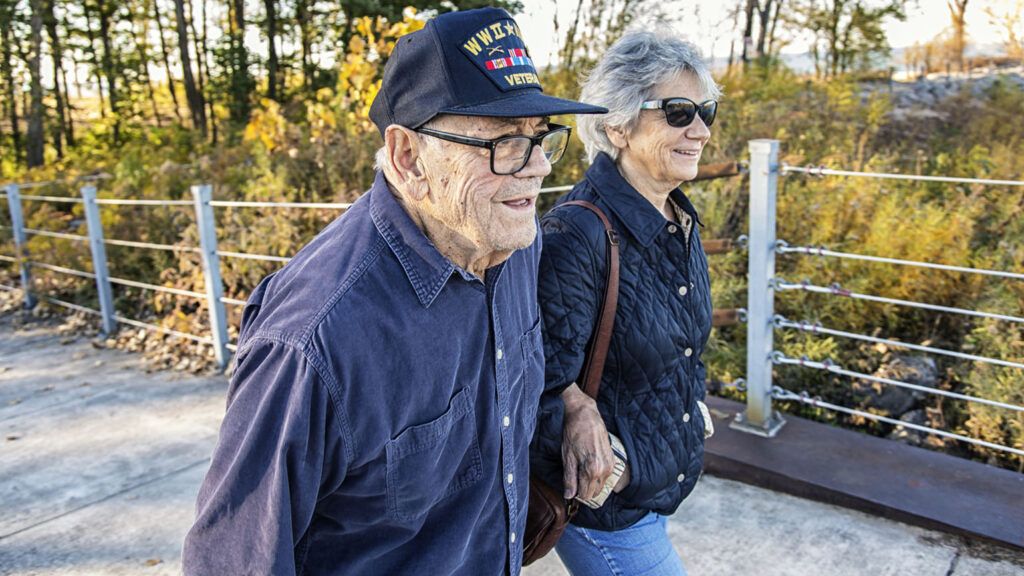Every year on the last Monday in May, Memorial Day honors those who have died in the nation’s wars. Originally known as Decoration Day, the federal holiday sprang from the Civil War when Americans in various parts of the country placed flowers on the graves of the battle dead. For veterans of all ages—whether they recall it primarily as Decoration Day or as Memorial Day—the holiday is traditionally infused with meaning. If you’re a caregiver to a veteran, the day is an opportunity to celebrate your loved one and to connect deeply. But for veterans who live with memory loss, a disability or a chronic health condition, a focused approach and some gentle reminders of their important place in history may be needed.
“Making it personal is paramount,” said Beth Heath, president of the We Can Be Heroes Foundation, which honors and helps veterans and unsung heroes. “My husband is a veteran, and many people tell him, ‘Thank you for your service,’ and he just says, ‘Thank you’ or ‘You’re welcome’ or ‘My pleasure.’ But when someone gets personal with him— ‘Where did you serve? What did you do? Did you enjoy your service? Were you in a foreign land?’—When people start asking him questions, I mean, they’ve got him.”
Heath shared the following tips to help you infuse Memorial Day with meaning for the veteran in your care, and to care for yourself as you do so:
Be clear about what you’re thankful for
“Let the veteran know what their service to our country means to you—their willingness to risk their life for you. It’s not just to say thanks for your service but to specifically say that you’re thanking them for defending you and providing the liberty that you have,” Heath said. “And sometimes when they’re talking about their service, they’ll talk about a fellow veteran in their unit—their best bud or best friend— so it leads them into remembering those people that are dear to them as well. You can also thank the veteran at our website. Doing that allows you to share your statement of appreciation with the veteran and your family and then across the nation.”
Get the story
“Ask the older veteran to tell the story of their military service or even perhaps a period of draft when they were serving in a war. That’s a very special way to honor veterans. Some of our older veterans have never spoken of their wartime experiences. We’ve had families that did not know where their veteran fought and their veteran was reluctant to speak about it to their family, to their wife, their husband because it was painful. So, getting them to tell their story of whatever they want to say in their own words is just so important,” Heath said, adding that it puts them on the track of sharing their worth with you.
“When you start out by making it real personal, then you can kind of open the door for more conversation: ‘I’d love to hear about where you served and what you did, some memory that you have or an experience that you’d like to share.’ People that have dementia sometimes may have even a flashback by seeing a picture of themselves in uniform or a cap—a Vietnam veteran cap, or a Navy or Army cap, whatever the situation may be—and a U.S. flag. You may see in their eyes that they’ll fix on it, on something that was memorable to them. It may not be a revolutionary breakthrough for someone with Alzheimer’s, but these things have a way of sinking in.”
Honor yourself as a caregiver
“That caregivers need caregivers is a fact. Everybody has to take a break,” Heath said. “Some caregivers think they can’t leave the person that they’re caring for for a minute. They think that they can’t go shopping or go to lunch with a friend. They think that they are in confinement. But they have to be able to recognize that if they don’t take care of themselves, their loved one will have no one to care for them. They have to be able to recognize that their emotional well-being is just as important as the emotional well-being of the loved one that they’re caring for.”
“The same TLC that the veteran gets, the caregiver must get—that same recognition, that same thank you—because they are just in quicksand,” Heath said. “Their service must be recognized equally too and they must be thanked and we must let them voice their stories.”
For information on resources for caregivers, including in-home and respite care services, go to the Eldercare Locator’s Caregiver Corner.






